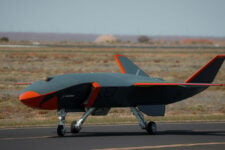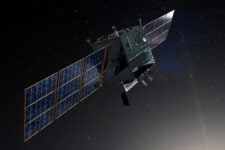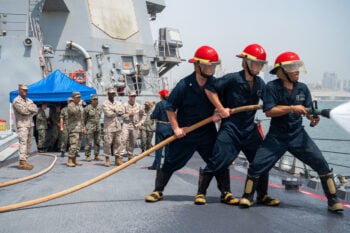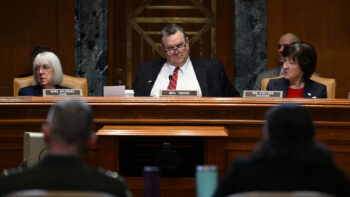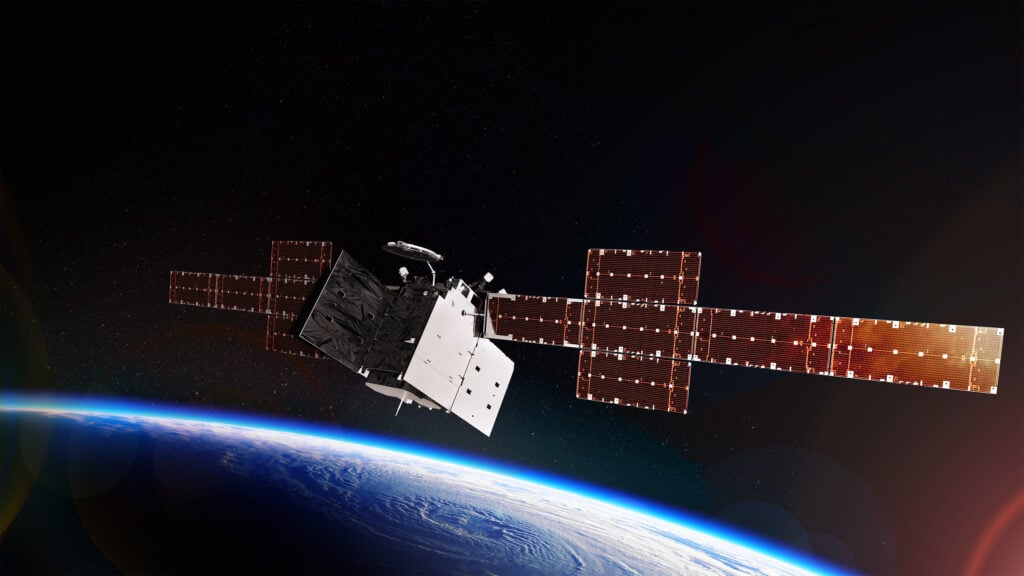
Operations of the Space Force’s Wideband Global Satcom military communications satellites could be outsourced to contractors. (Artist rendering of Boeing’s WGS-11+: Boeing)
WASHINGTON — As the Space Force rolls out plans for reorganizing its work force to meet the readiness demands of a potential fight with China, the service’s command responsible for providing personnel to operate space systems is eyeing using contractors rather than Guardians to run some satellite networks.
If America’s newest military branch moves forward with the idea, experts say it would represent a major shift in how directly contractors play a role in operating American space assets.
Space Operations Command (SpOC) now is evaluating industry responses to a request for information (RFI) on how contractors might not just provide training and support, but also people to serve as operators of systems related to “Space Domain Awareness, Missile Warning/Defense, MILSATCOM, Intelligence, and Orbital Warfare.”
That could include “operating spacecraft on the Wideband Global SATCOM (WGS) and Defense Satellite Communications System (DSCS),” and running “phased array radar to detect, track and characterize US and foreign assets,” according to the RFI.
Noting that the Space Force is only in its fourth year and still a “growing service,” Christoper Ayres, deputy to SpOC’s deputy commander general for operations, told Breaking Defense in an email that “this is one area where we are exploring opportunities to expand on our capabilities and use of manpower resources.
“We are considering contractor operations for operating satellites, as well as mission planning and training, with the intent to integrate contractors with military and civilian members to increase the efficiency of the force,” he said.
Ayres stressed that “incorporating contractors into supportive roles in operational space activities is not new or novel to the space domain,” including within the Space Force, as well as other agencies such at the National Reconnaissance Office (NRO), NASA and the National Oceanic and Atmospheric Administration.
A handful of outside experts familiar with the effort, however, asserted that SpOC seems to be pushing the envelope on contractor use, at least for the military services.
“This is not only new; it’s astounding. It’s shocking. It’s a huge change (if adopted),” one industry contractor said.
“There are contractors around the edges of operations – engineers in staff positions, IT, special systems augmentation positions, etc. There are even one-off full contract crews like DARPA’s Blackjack … The IC [Intelligence Community] has had contractors commanding satellites for years. So it’s not like there isn’t precedence,” the contractor told Breaking Defense in an email.
“But military operational crews are a sacred cow. They typically have at least 2 officers, a mid level NCO and 2-3 lower officers/enlisted per shift. This is the basic level training ground for space operations,” the contractor stressed. “This is where young Guardians learn space operations, learn Space Force culture, learn military culture”.
Todd Harrison, a long-time military space analyst now at the American Enterprise Institute, agreed that the Space Force request “looks like a new approach for operations and training support, but contractors have traditionally worked closely with military personnel in these areas. I think the big difference is bringing contractors directly into space operations crews and transitioning from government-provided training to a hybrid government-contractor approach for training.”
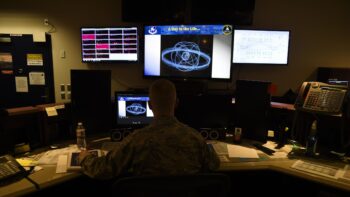
Space Force’s Delta 6 is responsible for cyber defense, but also operation of the aging Satellite Control System that manages US government satellites. (US Air Force photo/Tech. Sgt. Julius Delos Reyes)
Harrison said that for the Space Force the likely driver is the lack of trained forces for the many high-tech jobs the service needs to fill.
“While the impetus for outsourcing may have something to do with difficulties in filling positions with qualified military personnel, I think it makes a lot of sense regardless,” he added. “The reality is that in some areas the Space Force does not have as much expertise in modern space operations as some U.S. commercial companies, and outsourcing for expertise works well in space operations.”
Secure World Foundation’s Brian Weeden concurred that using contractors with hands-on expertise could help the Space Force deal with a running lack of trained Guardians, and the problem of having the time to get them up to speed.
This is something being faced, for example, by the 22nd Space Operations Squadron at Schriever SFB in Colorado that is responsible for running the Satellite Control Network (SCN) to manage military satellites.
“I think this makes a ton of sense, and I think it would be a real positive step for the Space Force in breaking away from the traditional DoD approach to personnel and force structure,” he said.
“There are a lot of space operations jobs that require technical skills/expertise that need years [or decades] of experience to develop.” But the traditional DoD personnel system provides only “several months of job training, followed by a few more months of on-duty training before you get certified for that job. And then after a year or two you need to move,” he added.
One former DoD space official also was bullish on the idea.
“I am a fan of contractors running the satellites — the NRO model. It is efficient rather than training young government people to sit in a chair for a year or two before moving on. They are always backed up by the contractors anyway,” the official said.
Another government expert who focuses on readiness and personnel management issues said that the concept is “really interesting” and may eventually have applicability to the other services, given the growing recruiting challenges the Air Force, Army and Navy all to some degree face.
“The Space Force is the first to kind of delve into this,” the expert said in an interview with Breaking Defense. “But it’s an issue the space in DoD across all the service like not having enough people to do what they want-slash-need to do as is a pretty significant challenge across the board. So what Space Force is trying to do here may or may not be a canary in the coal mine for some things that might be done elsewhere.”
Potential Contractor Downsides
Despite generally positive reviews, several experts noted that the concept does also come with some risks and may not be suitable for all types of milspace operations.
“The one area I would not do that in is if we ever deploy weapons — I would want a government chain of command and accountability there,” the DoD official said.
The government expert agreed that accountability, not just for weapons use but also for critical support operations, is one potential issue. Another, the expert said, is the potential for the Space Force to become overly reliant on expensive contractors and/or to get caught in vendor lock over time.
“There are definitely some pros and cons that come to mind,” the government expert said. “Let’s say Space Force goes into using contractors in a big, big way. How could they ever transition back to making those uniform positions? That could that could prove challenging in the future. … So, there are short-term benefits and long-term challenges.”
Harrison said that obviously there still are “some details that need to be worked out.” Unknowns include, he said, “how they plan to structure the acquisition to balance the need for continuity of personnel versus the need re-compete task orders periodically to maintain competitive pressure for performance and price.”
SpOC officials stress that because they are still in early days, they have yet to really figure out how exactly how a mixed contractor/Guardian operational force structure and command chains would work.
“As we gather this essential data, combined with historical context and consideration for future needs, Space Operations Command will be in the best position to making informed decisions on how to move forward in a way that supports essential operations, training, and development of the force,” Ayres said.
Likewise, it is too early for the command to have yet worked out an acquisition strategy, said Lt. Col. Casey Walterscheid, deputy director for contracting, space acquisition & integration office at SpOC.
“Gathering industry input will set the stage for future acquisition strategy, formal competition, and potential contract award,” he said.
‘Changes’ expected in ISR satellite operations to sort NGA, Space Force roles: White House official
“In the end, what we’re really going to have to figure out here is: what needs to change? Is it policies? Is it authorities? Is it processes? Is it funding? Is it purely just advocacy and communication?” said National Space Council Director Chirag Parikh.



